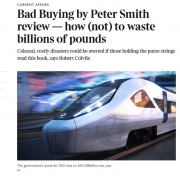Buyer / Supplier Collusion – A Difficult Fraud To Spot
What is the most difficult type of procurement-related fraud to detect? In my book, Bad Buying, there are plenty of examples of different fraud, some related to dodgy invoicing, fake suppliers or invoices, purchasing card fraud and more. But perhaps the hardest to detect are around collusion between a buyer (or someone else with power “on the inside”) and a supplier, with “backhanders” being paid in return for favours or preference shown to the supplier.
Last month a case that goes back some 10 years finally came to its conclusion. Not only did it have that sort of collusion at its heart, but it was also interesting to us because the victim was a firm well known in the procurement world – services firm Achilles, who run supplier qualification, risk and information services across industries including construction, transport, and energy.
Back in 2011, their interim head of IT, Brian Chant, led the process for choosing an IT supplier to whom Achilles would outsource significant work. However, the firm that was successful in winning the work, with Chant’s endorsement, also paid him some £475,000, according to the evidence presented in court. As the Register website explained,
“Unknown to Achilles was the fact that Chant, of Andover in Hampshire, had quietly approached the eventual winner beforehand to hand-hold them through the procurement process – and to arrange a hefty secret margin straight into his wallet”.
Chant left Achilles and joined Hampshire Police as its head of IT in October 2014 – a post he held until his arrest in 2016. But only now has the case been resolved. It seems that the criminal activity was discovered by the tax authorities initially, who were looking at VAT claims made by the IT company relating to invoices from Chant’s consulting firm. That led on to the criminal investigation, and finally to Chhant being sent to jail for 6 years.
What makes this type of fraud so hard to spot? Well, particularly if the contract is in a specialist area, it may be difficult for others in the buying organisation to realise that the fraudster is pushing the supplier selection decision in a particular direction. It may even be that the favoured supplier is not a bad choice (outside the corruption issue), and there may be no obvious losses to the organisation on the buy-side.
You also don’t have the ongoing potential evidence and chance of discovery that exists if, for instance, fake invoices are being submitted for payment, or someone is spending money outside policy on a purchasing card. Unless the payments from the supplier to the crook are picked up, then it is hard to gather evidence of this sort of behaviour.
What seems odd in this case is that the supplier and the people involved at that firm have not been named or – as far as we can see – prosecuted. I’m curious how they have avoided that. It’s hard to see really how they could have thought these were legitimate payments to Chant’s firm. It feels like other customers of that firm deserve to know its identity, apart from anything else.
So what can you do to try and avoid this sort of fraud? A strong procurement function (or even a single person for smaller firms) can help ensure that supplier selection processes are structured and as objective as possible. Involving multiple people in the analysis and the decision-making also helps, and of course, you should also ask those involved in procurement if they have any conflicts of interest. However, someone who is capable of fraud probably won’t worry about lying at that point!









Leave a Reply
Want to join the discussion?Feel free to contribute!